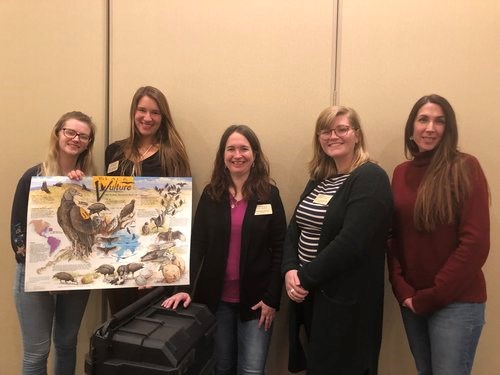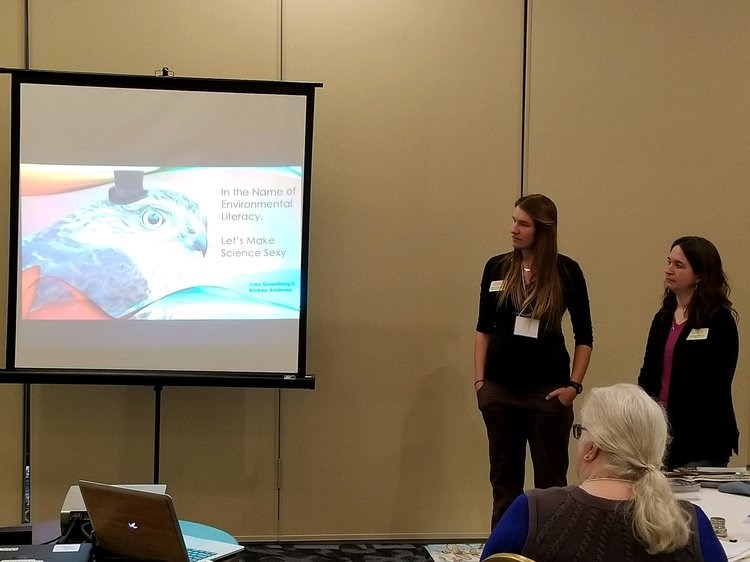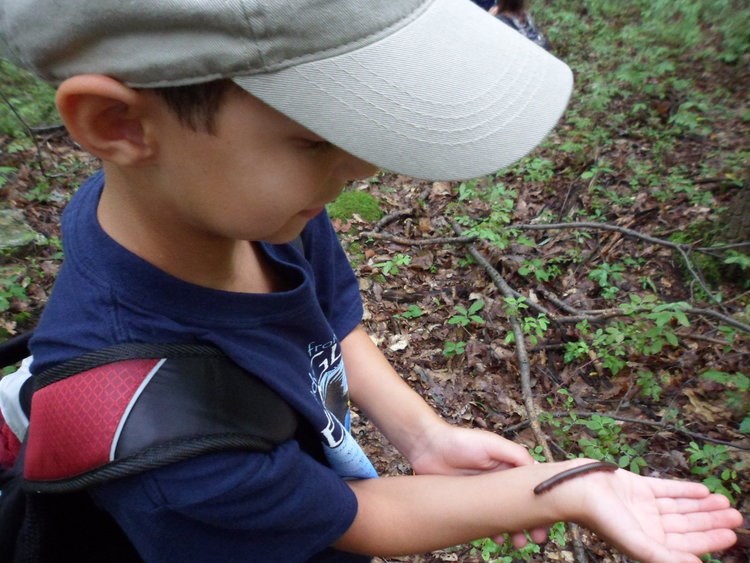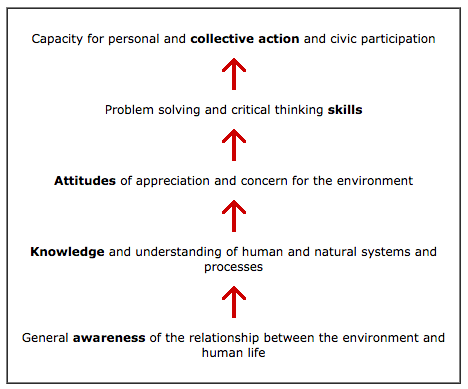Environmental Literacy: A Continuum
Posted on in In the Field by Zoey Greenberg, Science Outreach Leadership Trainee

This March, Hawk Mountain Sanctuary sent several members of the education team to the 2019 conference for the Pennsylvania Association of Environmental Education. This meeting of educators is held every year in hopes of encouraging networking, idea exchange, and cultivating a resurgence of passion for our state’s hard-working team of environmental educators. Attendees ranged from classroom teachers to naturalists to folks like Hawk Mountain’s own Andrea Ambrose, Todd Bauman and myself, all of whom presented on the efforts of the mountain to inspire nature immersion and appreciation of raptors. Erin Brown, Shannon Lambert, Riley Davenport were also in attendance, offering valued support and documenting our presentations.

Andrea Ambrose and I co-presented “How to make Science Sexy,” illustrating some of the ways that Hawk Mountain thinks outside of the education box, and engages visitors in creative ways. We focused on the importance of making science accessible, so as not to further perpetuate the lingering reputation that science is for academics only. Among our highlighted examples were detailed natural history posters on several of our migrants, our use of a turkey vulture rap to encourage vulture appreciation, Google earth animations highlighting black vulture movement data, our distance-learning raptor drunks, and build-a-bird kits, with which Andrea decked an attendee out in talons, a beak, and excellent eyesight to illustrate raptor adaptations to an amused audience. Todd Bauman gave an incredible presentation on the use of media to engage youth in natural history, highlighting his experience as a trip leader for the Hawk Mountain Conservation Corps.
These presentations also tied in with the conference theme of “Cityscapes and Greenscapes,” selected by conference coordinators as a way to discuss how environmental education intersects rural, urban, and suburban landscapes, green spaces and everywhere in between. As a well-known destination for both recreation and migration observation, Hawk Mountain attracts people from many walks of life and corners of the world, yet we are located in a rural area and maintain a strong connection with the perspective of Pennsylvanians. This diverse appeal provides us with many opportunities for educational innovation, and to top it off, we are exposing international conservation science trainees to the public, and the public to them. This mixing of world views is a rare and priceless element of education programming, and paves the way for the exchange of new ideas.
Another potent undertone to the conference was our global need for an increase in environmental literacy. Environmental literacy has been defined as the desired outcome of environmental education, which aims to provide learners with sound scientific information and facilitate the development of critical thinking skills as well as creative problem solving and decision-making abilities. Ideally the acquisition of these attributes would lead to increased environmental literacy, or an individual’s “understanding, skills and motivation to make responsible decisions that considers his or her relationships to natural systems, communities and future generations.”
This is a loaded description, and designing programs that achieve these learning outcomes and result in a more informed public can be a daunting task. However, many of us would agree that encouraging this holistic perception of our role within the environment is a societal outcome worth fighting for. One helpful way to break down this concept of environmental literacy is to think of it as a continuum, with a ladder of “steps” that individuals may climb over the course of their lifetime. Even those who work in the environmental field every day such as biologists, environmental educators and park rangers, are still climbing this ladder, and I would argue, there is no such thing as either a perfect score, or someone who is environmentally illiterate. We all start somewhere.
This conference caused me to reflect on where I see myself on the ladder, as well as how my own style of teaching about raptors may push people towards one level of literacy over another. This was an eye-opening thought process, and allowed me to experience the conference with a fresh perspective on how to engage people in a way that meets them where they are, rather than coerces them to meet me where I am. We all comes from different environmental backgrounds and I believe that working with your audience’s existing context is more effective than trying to persuade them to abandon their context for your own.

Due to the nature of this educational challenge, collaborative conferences like PAEE are immensely helpful in exposing educators to a variety of tool boxes, as well as success stories that demonstrate how honoring the environmental realities of a given community can stitch people together through a shared passion for the natural treasures in their area. I attended talks on how to get kids excited about bugs, the importance of marketing in conservation, how to tell science through story, the benefits of citizen science, and I even read love letters written by children to their watershed. I believe these local projects are important kindling for a more universal acknowledgment of our responsibilities to the natural world.
I will continue to nourish my own environmental literacy framework, and through my work with raptors, I hope to encourage the same desire in others. As I move through this process, I will remember David Sobel, whose words apply, in my opinion, not only to children but to every individual:
- David SobelIf we want children to flourish, to become truly empowered, then let us allow them to love the Earth before we ask them to save it.
